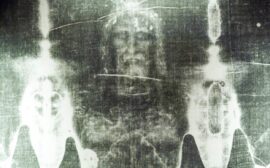 How did we get here? Where are we going? These are among the major questions that every human must face eventually. In modern times, six theories exist to explain the origins of the universe and humanity. For all but one, God is part of the equation. The first five balance two forms of revelation: natural and specific. Natural revelation is what can be known of God through nature. Natural revelation is revealed to all humanity. Specific revelation is God’s revelation of God’s self to human beings through a focused means. The Bible is recognized by many to be that form of specific revelation. The first five theories vary from strong emphasis on specific over natural revelation, or vice versa.
How did we get here? Where are we going? These are among the major questions that every human must face eventually. In modern times, six theories exist to explain the origins of the universe and humanity. For all but one, God is part of the equation. The first five balance two forms of revelation: natural and specific. Natural revelation is what can be known of God through nature. Natural revelation is revealed to all humanity. Specific revelation is God’s revelation of God’s self to human beings through a focused means. The Bible is recognized by many to be that form of specific revelation. The first five theories vary from strong emphasis on specific over natural revelation, or vice versa.
1. Fiat Creationism
Definition: This theory holds that the universe, and everything in it, was part of one particular creation event in time. This theory, also known as Young Earth Creationism, holds that the universe is not much older than 6,000 years. Adherents of this view believe that the days in Genesis 1 are to be taken to be six, literal, 24-hour periods of time.
Strengths: Fiat Creationism holds true to a most literal reading of the biblical text. There are no theological problems with Fiat Creationism.
Weaknesses: The core weakness of fiat creationism is found in the area of scientific data, or as some would say “natural revelation.” Astronomical data suggests that the universe is much older than 6,000 years. Also, fiat creationism fails in that it does not consider various breeds of animals that have developed, especially through the intervention of breeders. Millard Erickson writes, “The statement that God brought forth each animal and plant after its kind has traditionally been interpreted as meaning that he created each species individually. It must be pointed out, however, that the Hebrew noun (min), which is rendered “kind” in most translations, is simply a general term of division…It is at this point of the scientific data that fiat creationism encounters difficulty” (Erickson 1998, 503).
Famous Adherents: Ken Hamm and Answers in Genesis®, Barry Setterfield, Henry Morris, and Walt Brown are among the more famous fiat creationists.
2. Gap Theory Creationism
Definition: Gap theorists accept that the universe is old, but that the time of Genesis 1:2 through 1:31 represent six, 24-hour periods of time. To explain this, many gap theorists explain that there is a great gap of time between Genesis 1:1 and Genesis 1:2. Erickson explains, “The gap theory holds that there was an original, quite complete creation of the earth perhaps billions of years ago (the creation mentioned in Genesis 1:1). Some sort of catastrophe occurred, however, so that the creation became empty and unformed (1:2). God then re-created the earth a few thousand years ago in a period of six days, populating it with all the species” (Erickson 1998, 406).
Strengths: The gap theory merges the scientific data along with the biblical model. The gap theory gives a possible window into the fall of Satan which disturbed the creation of God.
Weaknesses: The fossil record seems to indicate that life has been on earth longer than the 6,000 year window attributed to it by some gap theorists. The theory is also speculative. Outside of the references in Isaiah 14:12 and Luke 10:18, nothing much more is known about the fall of Satan and the timing of the fall. Therefore, it is difficult to provide biblical or scientific evidence to back up the gap theory’s claims.
Famous Adherents: Oral Roberts, C. I. Scofield, Jimmy Swaggart, and Arthur Pink.
3. Progressive Creationism
Definition: Many in the Intelligent Design (ID) movement would identify themselves as progressive creationists. Progressive creationists understand the “days” of Genesis 1 to be six different phases of time, not limited to a 24-hour period. Erickson describes progressive creationism’s view on the development of life, “Progressive creationism sees the creative work of God as a combination of a series of de novo creative acts and an immanent or processive operation. God at several points, rather widely separated in time, created de novo (i.e., created afresh). On those occasions he did not make use of previously existing life, simply modifying it” (Erickson 1998, 505). God developed each kind of animal. However, different breeds developed among each animal over time. Dogs will not produce cats and vice versa. Each animal develops over time according to each kind.
Strengths: Greatly combines the biblical data with the scientific data. Recent scientific data seems to strengthen the progressive creationism’s viewpoint. No major theological doctrine is affected by progressive creationism.
Weaknesses: Some traditional Christians may have problems accepting the “days” listed in Genesis as phases instead of 24-hour periods of time. Some issues about sin and the entrance of death are listed as issues. However, many progressive creationists explain the fall of Satan as the cause of the entrance of death in the universe and the sin of Adam as the cause for death among humanity.
Famous Adherents: Hugh Ross, Fazale Rana, Stephen Meyer, Greg Koukl (reference in Stand to Reason podcast), and Michael Behe.
4. Theistic Evolution
Definition: Theistic evolutionists, like progressive creationists, are old-earth creationists (in that they believe that the universe and earth are old). Unlike progressive creationists, theistic evolutionists believe that God worked through the process of evolution. It was God that brought forth particular mutations in the gene pool at particular times. When it comes to humanity, Erickson explains, “Thus, while God specially created the spiritual nature of Adam, his physical nature was a product of the process of evolution” (Erickson 1998, 504).
Strengths: Many would find the claims of theistic evolutionists to fit well with modern scientific claims. Theistic evolution, if presented correctly, can still remain true to the Bible.
Weaknesses: If theistic evolution is presented incorrectly, the historicity of Adam and Eve are brought into question which could lead to a multiplicity of theological problems. Also, in recent years, evolution has been questioned by data that suggests that the human race really did come from two individuals. Also, the Cambrian explosion calls into question the idea that life developed over an extremely long period of time.
Famous Adherents: Francis Collins, Denis Alexander, and Kenneth R. Miller.
5. Deistic Evolution
Definition: Deistic evolution is a belief that is much like theistic evolution with the exception that the deistic evolutionist believes that God began the work and stepped out of the scene. Erickson states, “Thus, he programmed the process and then withdrew from active involvement with the world, becoming, so to speak, Creator emeritus” (Erickson 1998, 504).
Strengths: Like theistic evolution and progressive creationism, deistic evolution finds acceptance among many modern scientists.
Weaknesses: The problem with deistic evolution comes with orthodox biblical theology. Geisler says it best for the deist, “God does not reveal himself in any other way but through creation. The universe is the deist’s Bible. Only it reveals God” (Geisler 2012, 119). If this is the case, then the deist has demolished all sense of revelation and the miraculous.
Famous Adherents: (famous deists) Thomas Jefferson, Benjamin Franklin, Voltaire.
6. Naturalistic (Darwinian) Evolution
Definition: Darwinian evolutionists do not accept God’s involvement in the creation process. Erickson explains, “Our world is the result of chance or random combinations of atoms” (Erickson 1998, 502).
Strengths: The belief holds acceptance among many secularists. It is promoted strongly in secular academia.
Weaknesses: It is philosophically inept and, at times, unfair to the overall body of data. The naturalist cannot explain why the universe exists nor can the naturalist explain what gave the universe information and set the laws of physics into place. As Geisler states, “It is not sufficient for the naturalist to say there is something ‘more’ to the universe than the sum of all the events or ‘parts,’ for then he is not really explaining everything in terms of the physical ‘parts’ or events but in terms of something beyond them. It is, however, perfectly consistent for the nonnaturalist to insist that all the events of the universe cannot be explained solely in terms of the physical universe of events. But naturalism is not able to explain either itself or the universe on a purely naturalistic premise” (Geisler 2012, 383).
Famous Adherents: Richard Dawkins, Lawrence Krauss, and Sean Carroll.
Conclusion
All the six theories presented hold strengths and weaknesses. In this writer’s opinion, the sixth theory is the weakest as it holds many logical inconsistencies attributed, in part, to its affiliation to naturalism. It is also in this writer’s opinion that the third option is perhaps the strongest of the six as it holds the greatest amount of strengths and the fewest amount of weaknesses. One must take care not to place too much emphasis on any given theory…as they are interpretations of the two forms of revelation given to humanity (natural and specific). In the end, the most important truths found in Genesis 1 and in the scientific data are that we are here, the universe came to be over a process of time, and that God is the source of our existence. Those truths are what gives life purpose and value. Life is not a grand mistake. Life is, in fact, a grand design from an even grander Designer.
Bibliography
Erickson, Millard J. Christian Theology, 2nd Ed. Grand Rapids: Baker Academic, 1998.
Geisler, Norman L. The Big Book of Christian Apologetics: An A to Z Guide. Grand Rapids: Baker Books, 2012.
(c) Pastor Brian Chilton. 2013.






[…] for various Christian interpretations on creation, see my article “6 Views on Creation and Origin” here at […]